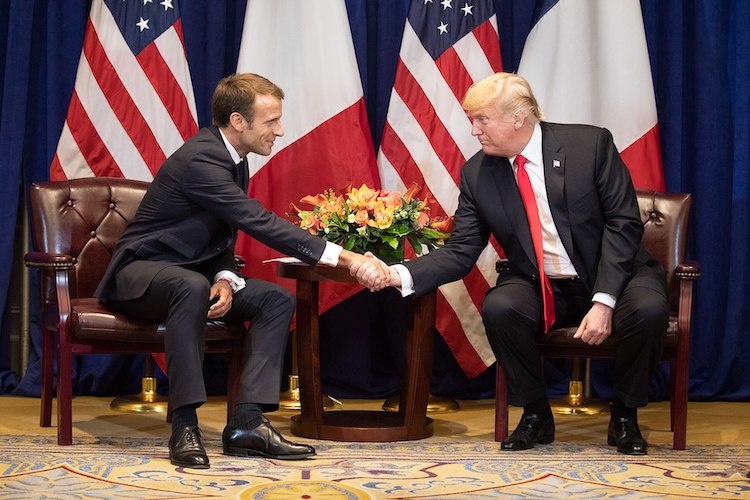Viewpoint by Jonathan Power*
LUND, Sweden (IDN-INPS) – Reacting to the radio interview by the French president, Emmanuel Macron, to mark Armistice Day, in which he was reported as saying, “We have to protect ourselves with respect to China, Russia and even the United States of America… We need a true European army”, President Donald Trump blew a fuse. He tweeted: “President Macron of France has just suggested that Europe build its own military in order to protect itself from the U.S., China and Russia. Very insulting.”
In fact Trump’s reaction was based on reading a false report of what Macron said. In that part of the interview he was talking about cyber-attacks. Nevertheless, Macron was indeed angrily critical of Trump: “When I see President Trump announcing that he’s quitting a major disarmament treaty which was formed after the 1980s Euro-missile crisis that hit Europe, who is the main victim? Europe and its security.”
The treaty is the so-called INF, the Intermediate-Range Nuclear Forces Treaty, an arms control agreement from 1987 that helped to end the Cold War. It was signed by President Ronald Reagan and Soviet President Mikhail Gorbachev.
Trump’s move comes after President George W. Bush killed off the thirty year old Anti-Ballistic Missile Treaty in 2002. At the time of its formulation the former U.S. defence secretary, Robert McNamara, when lobbying successfully for the treaty, argued that ballistic missile defence could provoke an arms race, and that it might provoke a surprise first-strike against the nation fielding the defence. The Russians regarded the Bush annulment as a step back to the fears and threats of the Cold War.
Now with the prospect of a second annulment Moscow is up in arms, more than ever convinced that Washington is out to get the nuclear upper hand. All the indications are that it is. Trump has already refused an offer by President Vladimir Putin to cut another 1000 inter-continental missiles, the same sized cut that was made with President Barack Obama. He is pouring tens of billions of dollars into upgrading U.S. nuclear forces.
This fits into the Trump philosophy of “America First”. He wants no constraints to be imposed on American foreign policy. This is why he quit the Paris climate accord and repudiated the international community’s nuclear deal with Iran. (Since this was approved unanimously by the UN Security Council the U.S. is breaking international law.) Trump has even decided that the U.S. will be leaving the 144-year-old Universal Postal Union. (He says that China gets too good a deal.)
The INF treaty establishes a prohibition of missiles with ranges between 500 and 5,500 kilometers.
Ending it is to inject an element of nuclear instability into European security. Russian nuclear weapons could then legitimately be targeted on Europe.
The administrations of President Barack Obama and Trump have both argued that Russia has acted in flagrant violation of the treaty. Russia’s deployment of a new generation of 9M279 land-based cruise missiles is said to be a direct challenge to the INF’s commitments.
However, the intelligence behind the U.S. claim has never been published. Russia has legitimately complained itself about the impact on the nuclear balance of new U.S. missile defence systems.
So far European countries have lined up with the U.S. But now the tide is turning. Macron recently had a phone conversation with Trump arguing that the U.S.’s remedy is counterproductive. He told Trump that he could lead a NATO-wide effort to hold Russia to the terms of the treaty, while discussing the pact’s extension to other nuclear powers that now have medium range systems of their own.
In an editorial on October 24, the Financial Times argued: “There is a temptation to see the idea of nuclear confrontation between great powers as belonging to the bygone age of Dr Strangelove. The world has moved on from mutually assured destruction. The reality, amplified by the demise of the INF treaty, is the threat of a new era of nuclear instability, this time unchecked by the agreements that stabilized the stand-off between the US and the Soviet Union….Now that the US has cut loose, why should China, India, – or, for that matter, Iran and North Korea – accept voluntary restraint?”
During the time of President Bill Clinton North Korea agreed to eliminate missiles with a range over 500 kilometers. The deal wasn’t finalized. Today it could be a base for constructing a new agreement. This would remove the Korean missile threat to Japan.
If the U.S. ceased its confrontation with Iran it could negotiate an agreement to limit its 500-kilometer-range systems. This would take away the Iranian missile threat to Israel.
India, China and Pakistan could agree not to nuclearize missiles with ranges below 500 Km. This would keep their short-range conventional missiles distinct from nuclear systems, reducing the destabilizing ambiguity in such missiles.
But Trump wants to blow up all these positive possibilities.
Note: For 17 years Jonathan Power was a foreign affairs columnist and commentator for the International Herald Tribune – and a member of the Independent Commission on Disarmament, chaired by the prime minister of Sweden, Olof Palme. He forwarded this and his previous Viewpoints for publication in IDN-INPS Copyright: Jonathan Power. Website www.jonathanpowerjournalist.com. [IDN-InDepthNews – 13 November 2018]
Photo: President Donald Trump and French President Emmanuel Macron in their bilateral discussion on September 24, 2018, at the Lotte New York Palace in New York. Credit: Wikimedia Commons.
IDN is flagship agency of the International Press Syndicate.
facebook.com/IDN.GoingDeeper – twitter.com/InDepthNews

